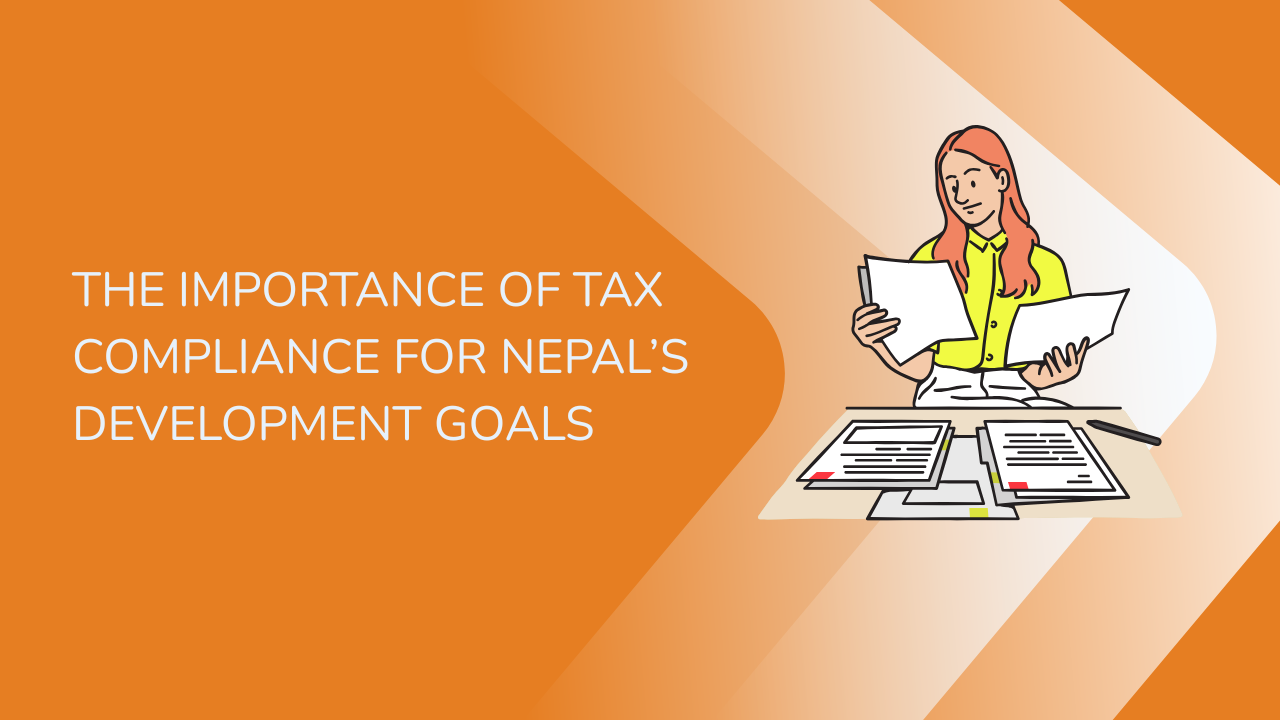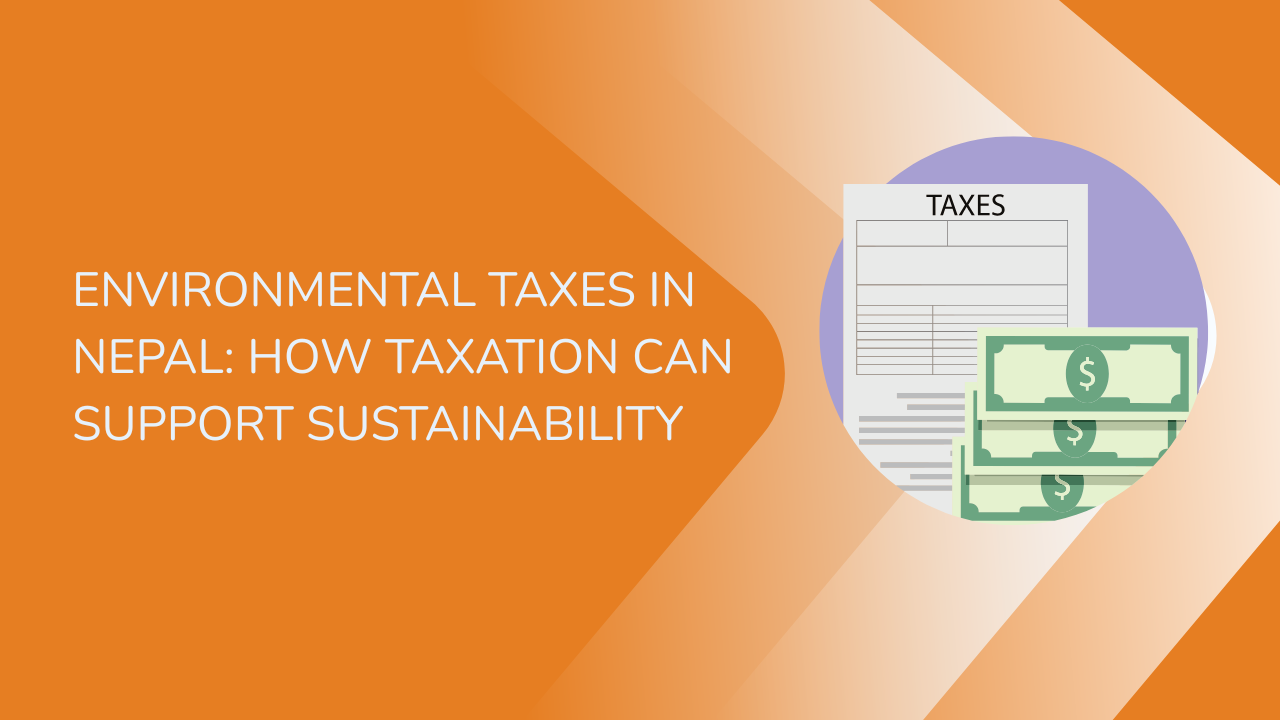Share this Article
Introduction
In the face of rising global environmental concerns, including climate change, biodiversity loss, and resource depletion, the adoption of sustainable practices is becoming imperative for countries worldwide. Nepal, home to diverse ecosystems, including the majestic Himalayas, and known for its ecological richness, faces unique challenges related to environmental conservation. With rapid urbanization, industrialization, and increasing consumerism, the country is experiencing mounting environmental pressures. Climate change exacerbates these issues, posing threats such as glacial melting, extreme weather patterns, and deforestation.
Environmental taxation presents an innovative solution to address these issues. By incorporating green taxes and incentives, Nepal can promote sustainability and combat environmental degradation. This blog explores how environmental taxes can be an essential tool in Nepal's efforts to build a greener, more sustainable future, offering a roadmap for policies that could foster eco-friendly behaviors across businesses, communities, and industries.
The Concept of Environmental Taxes
Environmental taxes, also referred to as eco-taxes or green taxes, are taxes levied on activities, goods, or services that harm the environment. The core principle behind such taxes is the idea of internalizing the external costs that businesses or individuals impose on the environment. This means that the taxes ensure those who pollute or deplete natural resources financially contribute toward their restoration and conservation. Environmental taxes can be instrumental in shifting behaviors, promoting eco-friendly alternatives, and encouraging sustainable practices.
In Nepal, where environmental degradation is evident, the adoption of environmental taxation could address several urgent issues:
- Incentivizing Pollution Reduction: By imposing taxes on polluting activities, such as emissions from industrial operations or vehicle exhaust, the government can encourage businesses and individuals to adopt cleaner technologies and more sustainable practices.
- Promoting Renewable Energy Use: Nepal’s abundant renewable resources—especially hydropower, solar, and wind—make it well-positioned to transition to a clean energy future. Environmental taxes on fossil fuels could push industries and consumers toward renewable energy solutions.
- Generating Funds for Environmental Protection: Revenue generated from environmental taxes can be allocated to fund environmental protection initiatives, such as waste management systems, forest conservation, and water resource management.
- Changing Consumer Behavior: Green taxes can encourage consumers to opt for products and services that have a lower environmental impact, thereby encouraging eco-conscious consumer behavior.
Key Types of Environmental Taxes for Nepal
Environmental taxes cover a broad spectrum, and their design and implementation must be tailored to Nepal's specific environmental challenges. Below, we outline some of the potential types of green taxes that could help Nepal transition toward a more sustainable future.
1. Carbon Tax
A carbon tax is perhaps the most well-known and widely discussed environmental tax. It targets carbon dioxide (CO2) emissions, a key driver of global warming and climate change. Carbon taxes apply to activities that release CO2, such as the burning of fossil fuels in transportation, energy production, and industrial processes.
Nepal, which relies heavily on fossil fuels for energy generation and transportation, could benefit significantly from a well-structured carbon tax system. A carbon tax would:
- Reduce Fossil Fuel Dependence: By making fossil fuels more expensive, a carbon tax could prompt industries and individuals to seek more sustainable alternatives, such as renewable energy sources (hydropower, solar, wind) or energy-efficient transportation.
- Encourage Renewable Energy Investment: Nepal has significant potential for renewable energy development. A carbon tax would make fossil fuel-based energy more expensive, providing an economic incentive for both businesses and consumers to invest in green energy solutions.
- Funding for Climate Adaptation: The revenue from a carbon tax could be earmarked for programs aimed at mitigating the effects of climate change in Nepal. This might include funding flood control infrastructure, reforestation efforts, or climate-resilient agricultural practices.
However, the introduction of a carbon tax would need to be carefully designed to avoid disproportionately burdening the poorest segments of society, who may not have easy access to affordable clean energy alternatives.
2. Plastic and Waste Disposal Tax
Nepal faces a significant waste management crisis, particularly concerning plastic waste. Plastic pollution is pervasive in both urban and rural areas, and improper disposal leads to environmental damage, including contamination of rivers, lakes, and soils. A plastic and waste disposal tax could help curb plastic pollution by discouraging the use of non-biodegradable plastic products.
A waste disposal tax could:
- Disincentivize Plastic Usage: By imposing taxes on plastic packaging or single-use plastic items, the government could push businesses to adopt biodegradable or recyclable alternatives.
- Generate Funds for Waste Management: The funds raised through this tax could be used to build and maintain recycling facilities, promote waste separation at the household level, and develop efficient waste collection systems.
- Public Awareness: The tax could serve as an educational tool to raise awareness about the environmental damage caused by plastics and encourage individuals to reduce their plastic consumption.
In addition, promoting alternatives such as reusable bags and containers would contribute to a more circular economy and help Nepal tackle its mounting waste problem.
3. Water Usage Tax
Nepal is rich in water resources, but these resources are unevenly distributed across the country, and water scarcity is becoming an issue in many regions. Agriculture, which is the backbone of Nepal’s economy, is heavily dependent on water, and inefficient water usage leads to waste and unsustainable consumption. A water usage tax could address the issue of water scarcity by encouraging more responsible water management.
- Encourage Water Conservation: A tax on excessive water consumption could push industries and agricultural sectors to adopt water-saving technologies, such as drip irrigation or water-efficient machinery.
- Funding for Water Infrastructure: The revenue generated could be used to improve water infrastructure, such as the construction of dams, irrigation systems, and water treatment plants.
- Sustainable Agriculture Practices: A water tax could incentivize farmers to implement water-efficient irrigation systems, thus promoting sustainable agriculture practices in water-scarce areas.
A water usage tax would need to balance economic activities with water conservation to ensure that it does not negatively affect agriculture, which is a major contributor to the nation’s economy.
4. Deforestation Tax
Nepal’s forests are vital for the country’s biodiversity, carbon sequestration, and watershed management. However, deforestation caused by logging, land conversion for agriculture, and infrastructure development poses significant environmental threats. An environmental impact tax targeting deforestation could incentivize businesses to adopt sustainable practices and preserve Nepal’s forests.
The deforestation tax could:
- Discourage Deforestation: Industries involved in logging or land conversion could face higher taxes on activities that lead to forest destruction, encouraging them to adopt more sustainable practices.
- Fund Reforestation: The funds collected could be used to finance large-scale reforestation programs and the establishment of protected areas.
- Promote Sustainable Forestry: By taxing unsustainable logging practices, Nepal could foster the development of more sustainable forestry and agroforestry systems, which can provide livelihoods while conserving forests.
This tax would need to be designed with careful consideration of the social and economic needs of communities dependent on forest resources.
5. Green Incentives and Subsidies
Along with taxes, green incentives and subsidies play an essential role in encouraging individuals and businesses to adopt sustainable practices. Rather than solely penalizing harmful activities, green incentives can reward positive behavior.
- Renewable Energy Subsidies: The government could provide subsidies for individuals and businesses that invest in renewable energy systems, such as solar panels or energy-efficient appliances, thus reducing their reliance on fossil fuels and promoting a cleaner energy future.
- Tax Breaks for Green Businesses: Businesses that focus on sustainability could receive tax breaks or incentives, making it easier for them to grow and invest in green technologies.
- Carbon Offsetting Programs: In addition to taxing carbon emissions, the government could introduce carbon offset programs where businesses and individuals can invest in projects that reduce or capture carbon emissions, such as reforestation or renewable energy projects.
These incentives would reduce the financial barriers to adopting sustainable practices, ensuring that businesses and individuals are motivated to make long-term investments in eco-friendly alternatives.
Challenges and Considerations
While environmental taxes have the potential to drive significant environmental benefits, they also come with challenges:
- Political and Public Resistance: Environmental taxes may face resistance from industries that are heavily reliant on polluting practices, as well as from the public who may view these taxes as burdensome. Building consensus around the necessity of these taxes and clearly communicating their benefits is critical for success.
- Economic Impacts: The implementation of green taxes could raise the cost of goods and services, particularly for industries that depend on energy-intensive processes. Policymakers must ensure that the taxes do not disproportionately affect low-income households or rural areas that may not have access to affordable alternatives.
- Tax Administration and Enforcement: Effective enforcement mechanisms are essential for the success of environmental taxes. This includes monitoring compliance, ensuring transparency, and avoiding loopholes that could undermine the taxes’ intended impact.
Conclusion
Nepal is at a crossroads in terms of environmental sustainability. By implementing environmental taxes such as carbon taxes, waste disposal taxes, and deforestation taxes, along with green incentives like renewable energy subsidies and tax breaks for green businesses, the country can transition toward a more sustainable and resilient future. These measures will not only help reduce the environmental impact of economic activities but also generate much-needed funds for environmental protection and climate change adaptation. The successful implementation of these taxes will require careful planning, political will, and public support. With the right approach, environmental taxes can play a pivotal role in helping Nepal achieve its sustainability goals and safeguard its precious natural resources for future generations.
Categories:
Tax Information
Tags:
E-commerce







